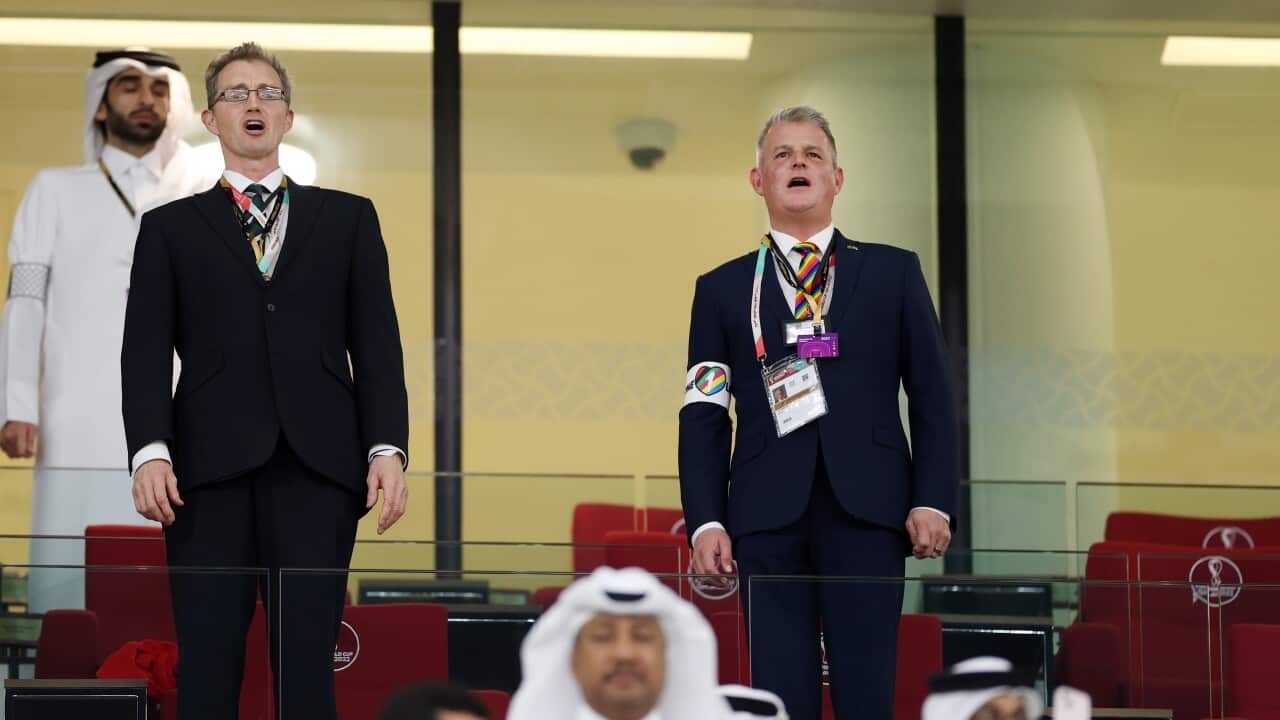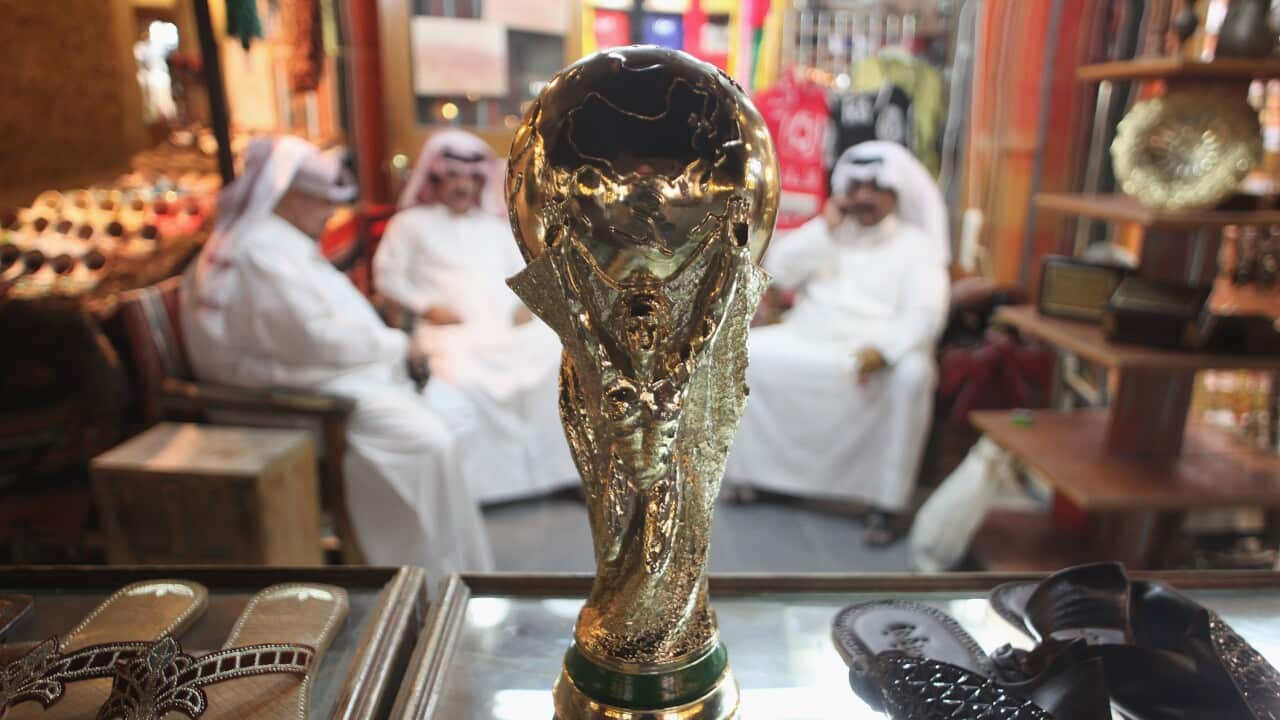Key Points
- Team captains had sought to wear the OneLove armband at the Qatar World Cup to highlight LGBTIQ+ rights.
- However FIFA has threatened players with yellow cards if they wear the armband in matches.
- Qatari football fan Ghada Al-Khater says OneLove's meaning is unclear.
It was intended to bring football fans together to support inclusion, but the OneLove armband has instead become a symbol of controversy at this year’s World Cup.
The captains of seven European teams - England, Wales, Belgium, the Netherlands, Switzerland, Germany, and Denmark - had planned to wear the bands during matches in protest to host nation .
That is, until FIFA threatened to issue yellow cards to any player who wore one.
The ruling by football's governing body was by western media, but did Qatari fans have a different response?
What do Qataris think of OneLove?
When the OneLove campaign was originally launched in 2020 by the Royal Dutch Football Association (KNVB), the armband was intended to promote inclusiveness and anti-discrimination.
Its design represented "everyone's pride of their heritage, race, gender identity, and sexual orientation", according to KNVB.
But in the lead-up to the World Cup being staged in a nation where homosexuality is illegal, its meaning appeared to evolve to symbolise LGBTIQ+ equality.
Qatari football fan Ghada Al-Khater said OneLove's meaning is unclear.
"What is this campaign even saying? And who is it saying it to?," she told SBS News' A (controversial) Podcast.
"Even in Europe, members of the LGBTQ community don't feel like they are represented in this campaign."
Ms Al-Khater said the colours used for the OneLove heart add to the ambiguity, as they look like a rainbow but don't correspond with the LGBTIQ+ pride flag.
"The vaguer the campaign, the easier it is to attach a lot of meaning to it and say that it's promoting many things, because it's not really giving insight," she said.
The multidisciplinary artist has put her own spin on it, taking the colours from the OneLove heart that are in the Ukrainian and Palestinian flags to make a point about what is and isn't deemed political.
"It's just to create this sort of visual link, and [show] that some people are allowed to protest their causes, while others are not," she said.
FIFA and European football's governing body UEFA have fined numerous teams in the past for fans or players displaying “political” messages such as colours linked to national movements.
In previous years UEFA has fined Scottish club Celtic and Spain's Barcelona after their fans displayed the flags of Palestine and Catalonia respectively.
of England, Scotland, Northern Ireland and Wales after players wore poppy badges - a symbol of remembrance of World War One - on their shirts in World Cup qualifers.

Ghada Al-Katar's artwork is a play on the OneLove logo. Source: Instagram / @geeak
Denmark's 'shocking' protest kit
Ms Al-Khater said the OneLove armband is just one example that the staging of the World Cup in Qatar "has become a battleground for who can display the strongest message".
"It's as if there is this pressure to do so, as if the coming here has to be a protest - it cannot be by choice," she said.
Ms Al-Khater said the Danish team's kit - which had been "toned down" as a form of protest against Qatar's human rights record - is another example.
"[It] came as a complete sort of shock that FIFA could allow or approve such a move and having a home kit completely in protest towards a country," she said.
FIFA's rules state "team equipment must not have any political, religious or personal slogans, statements or images".
Before Denmark's round one game against Tunisia, its otherwise all-red home kit was altered to include a large Danish flag.
Qatar was 'set up to fail'
Many Qataris have taken issue with the "one-sided" and "hypocritical" portrayal of their home country and its human rights record in the lead up to the World Cup, including Ms Al-Khater.
She said the rest of the world had been against Qatar hosting the tournament since it won the bid 12 years ago.
"It seems like in the past decade, this focus on the World Cup and politics has been extreme," she said.
"And I think that's where the double standard lies, whether it's through the reporting of Qatar or the banning of Russia from the World Cup."

Ghada Al-Khater is a Qatari multidisciplinary artist and football fan. Source: Supplied / Ghada Al Khater
"Where does FIFA draw the line? Or where do countries draw the line?" she said.
The way Qatar has been painted in Western media means that no matter what positive progress is made, some will always view it in a negative light, Ms Al-Khater said.
"Rich, and human rights abuses are pretty much everything that this country or this region is all about," she said.
"That lens sort of diminishes everything this region is doing or has done for the past decade, and it kind of sets you up to fail in a way."
But Ms Al-Khater is hopeful that other people's minds can be changed about what Qatar and the wider Middle East region is really like.
"There is no greater experience than experiencing a new culture for yourself and formulating your opinions for yourself," she said.
"They are always welcome."
Watch every match of the FIFA World Cup 2022,



